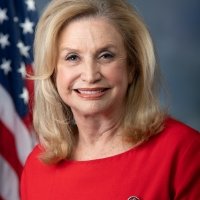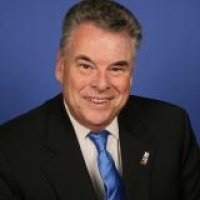WEBCAST: How Congress is Taking on Global Kleptocracy and Corruption
In our globalized world, kleptocracy and corruption are no longer bound by geography. In fact, much of that stolen wealth weaves its way through the international shadow banking system and ends up in the United States, with consequences for the American economy, democracy, and national security. Congresswoman Carolyn Maloney (D-NY12) and Congressman Peter King (R-NY2) discussed what the United States Congress is doing to take on global kleptocracy and corruption.
SUMMARY
In a panel introduced by Wilson Center Director, President, and CEO Jane Harman, and chaired by Kennan Institute Director Matthew Rojansky, speakers Congresswoman Carolyn Maloney (US House of Representatives, New York, 12th Congressional District) and Congressman Peter King (US House of Representatives, New York, 2nd Congressional District) discussed the Corporate Transparency Act and their endeavor to combat shadow banking.
Congresswoman Carolyn Maloney began by introducing the Corporate Transparency Act, a bill which would combat the use of shell corporations by requiring corporations and LLCs to disclose information about their beneficial owners. Congresswoman Maloney explained that shell corporations present a national security threat, as they are a popular tool among malign actors to finance criminal or terrorist activity. She went on to illustrate the pressing need for the bill in the United States, explaining that criminal investigations are often stymied by anonymous shell companies. Congresswoman Maloney responded to critics of the bill, who assert that the duty of disclosure would be burdensome, by highlighting the low cost of compliance and increased efficiency. Congresswoman Maloney concluded by highlighting the strong support for the bill and diverse stakeholders.
Congressman Peter King continued the discussion of the bill by recalling his and Congresswoman Maloney’s inspiration for the legislation after the events of 9/11 and the revelations surrounding the operation’s financing. Congressman King emphasized the strong support for the bill among law enforcement agencies, NGOs, and human rights groups and the concentrated focus of the bill on companies with fewer than twenty employees. He then explained their choice of the Financial Crimes Enforcement Network (FinCEN) as the recipient of the beneficial owner data, noting their unique capabilities to store, collect, and distribute the information.
In the question and answer period, Congresswoman Maloney and Congressman King reiterated the long bipartisan development of the bill and the significance of enacting legislation rather than relying on regulations.
Director Harman closed the discussion by highlighting how the bill has remarkably overcome the barrier of bipartisanship to gain widespread support by a variety of stakeholders, paving the way for the bill’s success.
Selected Quotes
Jane Harman
“When most people think of the phrases shell company or tax haven they probably think of places like the Cayman Islands or Switzerland, but the reality is that according to the International Tax Justice Network, the United States ranks second in the world for global financial secrecy. States like Delaware, Nevada, and Wyoming, all wonderful places, are well-known sadly by those with dirty money for their loose regulations when it comes to setting up anonymous shell companies, which are the main way modern kleptocrats move around and launder their assets.”
Matthew Rojansky
“There’s no question that stolen money and ill-gotten gains have been able to gallivant across the world at an unprecedented rate. In fact, many have argued, and I think correctly so, that the entire course of development of the former Soviet world over three decades has been different as a result of the access that leaders in that part of the world have had to Western markets to squirrel away their dirty money.”
Congresswoman Carolyn Maloney (D-NY12)
“As you know, I’ve been working very hard on a bill called the Corporate Transparency Act, which would crack down on the illicit use of anonymous shell companies…This is one of the pressing national security problems we face in our country because anonymous shell companies are the vehicle of choice for money launderers, criminals, and terrorists. The reason they are so popular is because they can’t be traced back to their true owners. Shell companies allow criminals and terrorists to move their money around in the U.S. financial system, and finance their operations freely and legally.”
“Unfortunately we know that the U.S. is one of the easiest places in the entire world to set up anonymous shell companies…[S]tates don’t require companies to name their true beneficial owners: the individuals who are collecting the profits and who outright own the company. We’re the only advanced country in the entire world that doesn’t already require disclosure of this information and frankly, it’s an embarrassment.”
“When the Panama papers came out last year one of the most common questions is why weren't more Americans involved, and the answer is that Americans don't have to go to Panama to set up anonymous shell companies. They can do it right here legally in the United States.”
“This bill would plug a huge hole in our national security defenses and would be a massive benefit to law enforcement, but this bill would also shore up the safety of our financial system and would streamline the compliance costs for financial institutions that are trying to make sure that terrorists and criminals aren’t secretly using U.S. banks to move money around.”
“No American who walks into a bank branch can open an account without identifying themselves, without saying what their name is, what their address is, and providing some proof that they are who they say they are. So why should companies be able to open bank accounts and deposit millions and millions of dollars without also identifying who owns them.”
“According to a study by global financial integrity you have to disclose more information to get a library card then you have to disclose to create a corporation or LLC, and you don't hear people complaining about the burdens of getting a library card. So I think the idea that this disclosure [required by the bill] would be unduly burdensome is simply false.”
“A lot of times, the shell companies are nothing more than real estate…mainly they just buy a building or they buy an apartment in New York. You can go through my district tonight and a half the buildings don't even have lights on there.”
Congressman Peter King (R-NY2)
“One of the real problems we have with the Homeland Security Committee is that some of the other committees can claim a piece of the jurisdiction. We could have a simple, not a simple bill, but a bill like chemical plant security…or port security, and then you'll find this committee or that committee would claim a small part of the jurisdiction and it can [take] months to get it through, or you have to make unreasonable concessions to them to move the bill.”
“Prosecutors can always abuse, criminal defense lawyers can always abuse. It's there, that's part of the system, and it's up to us to try to monitor that, it’s up to the courts to try to monitor it, but it's not, nothing's easy, but also, you know, the Constitution is not a suicide pact. We have to try to work within it to get the job done, always aware that when human nature there are people who are going to try to abuse the system, just like this, you know the financial people are abusing a system with these shell operations.”
“There is that fine line between defending unsavory individuals entitled to day in court, but doing it through totally legal means. And we've had, let's face it, organized crime cases, we've had lawyers using illegal assets, you know, for their fees to be paid or to sponsor the cases…Lawyers should be careful if they try to work with clients to surreptitiously violate or not comply with this act. I would consider that to be in violation of law, certainly something that could be subject to disbarment proceedings…There are lawyers who have been engaged in actually facilitating money laundering—forget the international corporations or anything else, we're talking about just organized crime here in this country where lawyers have worked with clients to, you know, hide the money, to launder the money…Hopefully this type of legislation is going to crack down on that, make it more difficult for them to do.”
“I mean, thank god for the fall of the Soviet Union but on the other hand it opened up a whole array of different issues we never thought of before or certainly never thought of them, you know, to this extent. So you have then, also obviously coming from the Middle East, you have, again, big money people, oil people coming here and, you know, they end up contributing to large universities, becoming very active and prominent in charities and they do get a sort of a respectability.”
“[It’s] up to us as leaders, and to the media and to academics, to…not just fall for the fact [that] because a person is getting a building named after himself at a university that suddenly he becomes respectable and his human rights record back home or his flagrant corporate violations somehow go away…Again, I don't know what the answer to that is…I guess people who have stature, have the money and others attach themselves to them and they end up in some cases literally getting away with murder.”
Speakers


Introduction

Moderator

President and CEO, US Russia Foundation
Hosted By

Kennan Institute
The Kennan Institute is the premier US center for advanced research on Eurasia and the oldest and largest regional program at the Woodrow Wilson International Center for Scholars. The Kennan Institute is committed to improving American understanding of Russia, Ukraine, Central Asia, the South Caucasus, and the surrounding region through research and exchange. Read more


Congressional Relations
The Wilson Center’s office of Congressional Relations works to maintain a vibrant relationship with Members of Congress and their staffs. We organize and run a series of educational programs led by Wilson Center experts, ranging from seminars to private briefings, with the purpose of increasing congressional staffers’ knowledge of foreign policy. We also coordinate outreach to Capitol Hill, including testimonies by Wilson Center scholars and briefings specifically for Members of Congress. Read more
